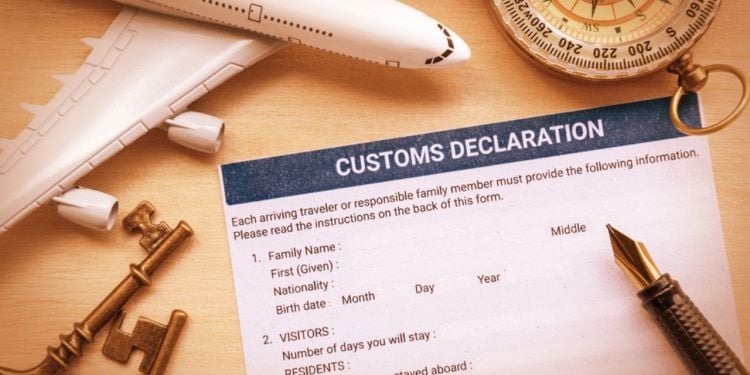
Thanks to New Zealand being a remote island nation, it has a unique ecosystem that can be quickly thrown out of balance by the introduction of plants and animals from elsewhere. In the 19th century, rabbits, rats and stoats were introduced, quickly devastating native species. These days, the introduction of exotic species is tightly controlled, and those arriving in New Zealand will encounter rigorous customs and biosecurity measures, especially when it comes to bringing in food, plants, animals, and any organic materials.

If you have been camping or working outdoors or on farms, it's not uncommon for your tents, equipment, boots and other gear to be inspected, cleaned, and returned, which can mean the time spent passing through customs can take longer than anticipated.
Declaring what you are bringing into New Zealand
The best place to check whether you might encounter issues regarding your luggage is to refer to the Customs website, which continuously updates the list of prohibited or restricted items and provides information about what does and does not need to be declared in New Zealand. On the plane, when traveling to New Zealand, you will be given a Passenger Arrival Card on which you are required to declare what you are bringing in. This is a legally binding document, so if you fail to declare, or provide incorrect information, about the contents of your luggage, you can be fined NZ$400.
According to current Customs regulations, you must tick ‘yes' on your card if you are bringing in any of the following:
- Medicine – over 3 months' supply, or medicine not prescribed to you
- Restricted or prohibited goods, for example, weapons, indecent publications, endangered plants or wildlife, illegal or controlled drugs
- Alcohol – more than 3 bottles of spirits (not exceeding 1.125 liters each) and 4.5 liters of wine or beer
- Tobacco – more than 50 cigarettes or 50 grams of tobacco products (including a mixture of cigarettes and other tobacco products)
- Goods obtained overseas and/or purchased duty-free in NZ with a total value of more than NZ$700 (including gifts)
- Goods carried for business or commercial use
- Goods carried on behalf of another person
- Cash – NZ$10,000 or more (or foreign equivalent), including travelers' cheques, bank drafts, money orders, etc.
Regardless of the information you provide on your card, the customs agent will ask you what you have on you. This will also help them decide whether they need to search your bags or not. If you do have anything on you that is considered a risk, these items will be confiscated and then destroyed. If you have items like hiking boots that have dirt on them, customs agents may take them away to clean them before returning them to you.
Restrictions for travelers in New Zealand
As well as having to declare a wide range of items, there are also restrictions on what you can bring into New Zealand, as well as some things that are completely prohibited.
Tobacco and alcohol
If you would like to bring tobacco and/or alcohol into the country, you must adhere to New Zealand's strict restrictions. If you bring in anything above the required amounts, you will be charged a ‘duty' tax on them. To bring alcohol or tobacco into New Zealand, you must:
- Be at least 17 years old
- Have them on your person when going through Customs
- Intend to either use them as gifts or for your own use
- Not carry them in for someone else
- Not plan to sell or exchange them once in the country
You are limited to the following amounts of tobacco:
- 50 cigarettes
- 50 grams of tobacco
- 50 grams of cigars
- A mix of the three not exceeding a total weight of 50 grams
Alcohol:
- 4.5 liters of wine or 4.5 liters of beer
- 3 bottles of spirits or liqueurs, each containing no more than 1125 ml.
Prescriptions/Drugs
All controlled substances, i.e., cannabis, methadone and pseudoephedrine, are prohibited from entering New Zealand, with the possible exception of a one-month supply with a proven doctor's prescription per person. To be considered lawfully carrying a prescribed controlled substance, you must:
- Be carrying it for yourself or someone in your care
- Declare that you have the substance on your arrival card
- Have a copy of the doctor's prescription or a letter from your doctor detailing your treatment, the drug's name, and the dosage
- Ensure the drug was supplied lawfully in your originating country
- Carry the drug in the original container
- Only have the maximum of a one-month supply
Important:
All drug-taking paraphernalia is strictly prohibited. Any evidence found that you are attempting to smuggle prohibited drugs into the country will result in imprisonment.
Cash and goods
You may carry up to NZ$10,000 in cash. Goods purchased overseas for personal use cannot exceed a value of NZ$700. Duty charges for clothes and personal effects are usually waived, especially if you are visiting and plan to take everything back out of the country with you.
Vehicles and household items
If you are moving to New Zealand permanently, you may be bringing household items, heirloom items, motor vehicles, or even boats. Most of these can remain exempt from duty fees as long as you have lived outside of New Zealand for the previous 21 months, they were purchased and used by you in your home country for at least a year, you've arrived in New Zealand with authorized permanent residence, and you do not intend to sell any of the items within two years of living in New Zealand.
Always check the NZ Customs Website for more details and the most up-to-date information about border restrictions.
We do our best to provide accurate and up to date information. However, if you have noticed any inaccuracies in this article, please let us know in the comments section below.








